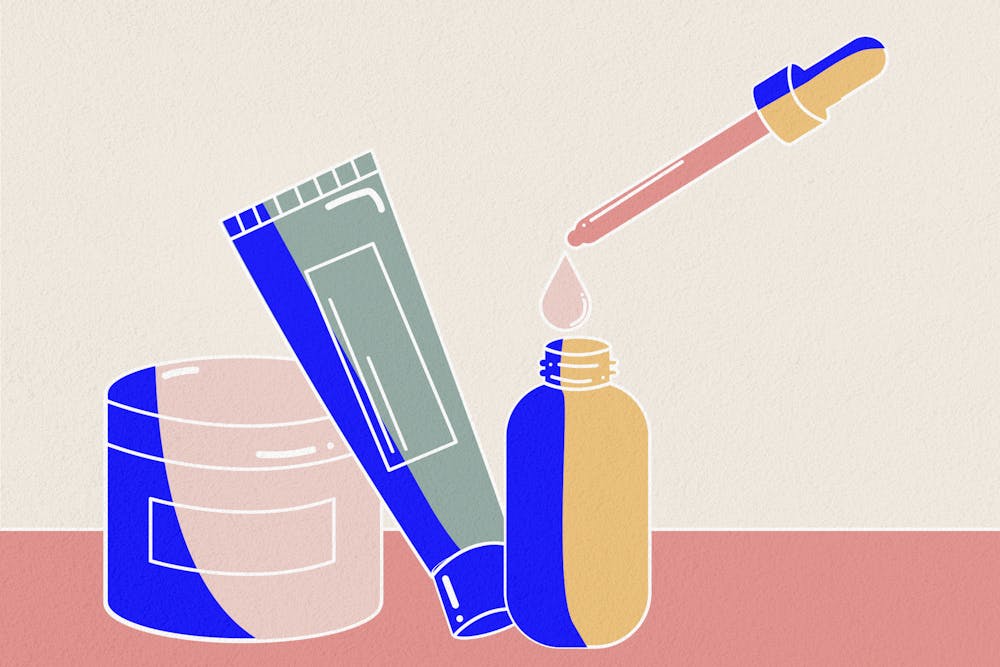Skincare advice has rapidly become a popular subculture on TikTok, and for good reason. A number of specialists, estheticians, and dermatologists give advice to teens struggling with acne or other skin concerns, explaining how the complicated ingredients in skincare products—like retinol and exfoliating acids—work in a way that is easily understood by the everyday consumer.
But where “SkinTok” goes wrong is when people with no expertise in skincare become a source of product recommendations for young people looking for a quick fix for their acne concerns. This isn’t to say that users shouldn’t post their routines if they want to, but just because one person found that washing their face with bar soap and moisturizing with rosehip oil was the solution to all of their skincare woes doesn’t mean that it will be a cure–all for everyone.
A notable example of how misleading SkinTok can be is the rise of DIY skincare. While trends like make–at–home coffee scrubs and citrus exfoliators have long been popular on other sites, TikTok has only added to their prevalence. Unfortunately, as dermatologist Dr. Muneeb Shah–also known as @dermdoctor—explains, these ingredients can be damaging to the skin, especially when not formulated in a lab with proper preservatives.
The popularity of "natural" skincare has also become a cause for concern among dermatologists who see rampant misinformation being spread on social media about the supposed dangers of certain chemicals. For example, Dr. Oz published a now–debunked article suggesting that “your sunscreen might be poisoning you,” despite the fact that sunscreen is one of the most important steps in a skincare regimen. Sunscreen is known to help prevent UVA/UVB damage that can cause skin cancer. Yet rumors surrounding its effectiveness and the usefulness of similar essential skincare products are easily disseminated to young people via apps like TikTok.
TikTok users touting the use of “natural” oils (essential oils, coconut, or olive oil) in skincare is another area of concern. Tea tree oil, a common ingredient in acne–fighting products, can actually cause excess irritation and worsen acne compared to ingredients like salicylic acid and benzoyl peroxide when used in excess. Coconut and olive oil, despite often being praised as great additive–free moisturizers, can actually clog pores, as explained by Dr. Amena Alkeswani in this TikTok.
On a more positive note, skincare advice on TikTok has also caused a major uptick in the purchase of expert–approved cosmetics. Videos by @skincarebyhyram, a skincare specialist with over 6.5 million followers, and other influencers were so popular that several products from CeraVe, a dermatologist–developed brand, sold out at a number of drugstores and websites.
The Ordinary also saw substantial growth in sales after a viral TikTok featured one of their products. Their 30% AHA + 2% BHA peeling solution sold 52,000 units in the two week period after this video praising its acne–fighting abilities was posted.
But as popular as this product is, there have still been some concerns raised by experts regarding its popularity, as everyone's skin will respond differently to skincare products. Dermatologists and estheticians on TikTok worry that some people might be overusing the rather harsh chemical exfoliator, which, despite the bottle suggesting its use twice a week, is typically recommended by experts as a once–a–week treatment. Using a peel even once a week can be too much for sensitive or damaged skin.
On top of this, darker skin tones are typically more susceptible to hyperpigmentation and sensitive to ingredients like glycolic acid, which is also in the product. Some people have even reported experiencing chemical burns after using the peel.
Does this mean these products are all terrible and that you should never take skincare advice from TikTok? Absolutely not. A lot of people see great results from using chemical peels and CeraVe. Some people might respond well to using coconut oil if they have extremely dry and non–acne–prone skin. But where you can quickly run into problems is seeing one user's routine and assuming it will work for your skin, disregarding warnings given by qualified dermatologists.
If you’re interested in a product but not sure whether the ingredients are good, or if you can barely read them without referring to a biochemistry textbook, start by using online resources like the Paula’s Choice’s ingredients dictionary to look up active ingredients on the bottle, or CosDNA’s cosmetic analyzer to check all the ingredients at once for their likelihood of irritation and comedogenic rating.
By using these resources and listening to trustworthy experts, you can minimize the likelihood of damaging your skin or having an adverse reaction to a product. So enjoy all the skincare content you want, but just remember to fact–check what you hear. Not every product you see on TikTok will be good for your skin type.







